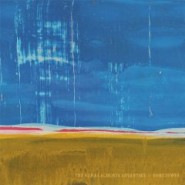 The Rural Alberta Advantage
The Rural Alberta AdvantageHometowns
Score: 22
The Rural Alberta Advantage (guess where they’re from) released its first full-length independently last year, but rereleased it under the Saddle Creek Records label earlier this week. Not satisfied with the reference in their name, the band named their first album Hometowns. The same creativity that accompanies the band’s naming scheme is quite apparent in the album’s drums and vocals, which, to put it bluntly, ruin the entire album.
The best traits of Hometowns are undoubtedly shown in the guitar and keyboard/organ lines. The first track shows off the keyboard quite well with a simple line set in an amazing tone that almost sounds like extremely pure throatsinging, bringing out the beautiful harmonics of those tones, while “The Air” stresses the guitar with a pleasant and well constructed acoustic line. What makes the instrumentals as a whole disappointing is the drums, which would fit better on a hard rock album than on Hometowns. Not only are the drums loud enough that they even begin to drown out the other elements of the tracks, but they are incessantly active, with overindulgent fills and beats that rarely fit the tone the album otherwise attempts to create. Additionally, the tambour of the drum set is extremely hollow and fuzzy, which does nothing to improve the already overly pervasive drum line.
While it’s true that Nils Edenloff’s voice shares quite a lot with many other indie lead singers, this isn’t a compliment: he shares most of the problems and few of the strengths. Edenloff’s voice is simultaneously thin, drawn, and shrill through most of Hometowns, creating a constantly irritating vocal line. In the extremely rare cases where he steps out of his two-note comfort zone, it’s just to add a third mistreated note. All of this adds up to a drone which is not only irritating but frankly boring - even the most theatrical proclamations seem no more than overdone and unexciting. Issues with the mixing lead to an impenetrable mash of Edenloff’s vocals and the instrumentals, which has the effect of dampening the vocals and emphasizing the generally much superior instrumentals - but which leaves the tracks in a state of utter confusion. The occasional appearance of Amy Cole on backup vocals is quite welcome, but her additions are too timid to counter Edenloff’s input. Nevertheless, when Cole’s remarkably in-tune voice coincides with the rare instants when Edenloff’s voice reaches an uncharacteristic level of inspiration (the end of “Frank, AB” and most of “The Air”), the music improves from awful to safely mediocre.
Many of Hometowns’s lyrical lines are incomprehensible due to the drone into which Edenloff’s voice incessantly slips. Those which are more clear do the album no favors, comprised as they are of romantic cliché and banality. Partially thanks to his voice, Edenloff utterly fails to excite as he entreats a former love not to “haunt this heart” or remembers how “you said you would change my heart into petrified wood.” But either of these mediocre lyrics fades in comparison with the utterly useless end to “Don’t Haunt this Place”: “I know it’s right I know it’s okay / And I’d like to see you now and again / This was hard it was dumb we should do it again / Give ourselves some time ten years from the day,” where Edenloff seems to be desperately combining alt-romance and an ample supply of inanity to finish off a colossally mediocre effort.
Overall, The Rural Alberta Advantage does an incredible job of masking what good the album contains. The vocals safely satisfy this requirement most of the time, and when they don’t, the drums are not far away. And while some tracks are worsened by only one element, there are others that fail to live up to even those expectations. “Luciana,” easily the worst track on the album, combines the whining, harsh vocals and overambitious drums, and places them alongside a completely uninteresting, dense guitar line. The result has no direction, no interesting catching points to pull the track together, and no low tones to at least secure the track. Even the addition of instruments towards the end of the track only serves to convolute an already overly populated track.
We’d love to say that Hometowns had potential. We also don’t like to lie. Between Edenloff’s incessant whine and pointless lyrics, the dull thud of the percussion, and the mediocre overall composition, Hometowns was sunk before it really began. While it’s true that the guitar and keyboard aren’t bad, and from time to time are actually decent, the badly-done aspects of the album quickly overshadow these strengths. Hometowns contains a few very short moments of inspiration, which are quickly covered up by the uninspired status quo of the album. All in all, the best that can really be hoped for from Hometowns is that Rural Alberta Advantage learns from their mistakes and, perhaps, creates a better second album. We won’t hold our breath.
This post is tagged 20-29, The Rural Alberta Advantage